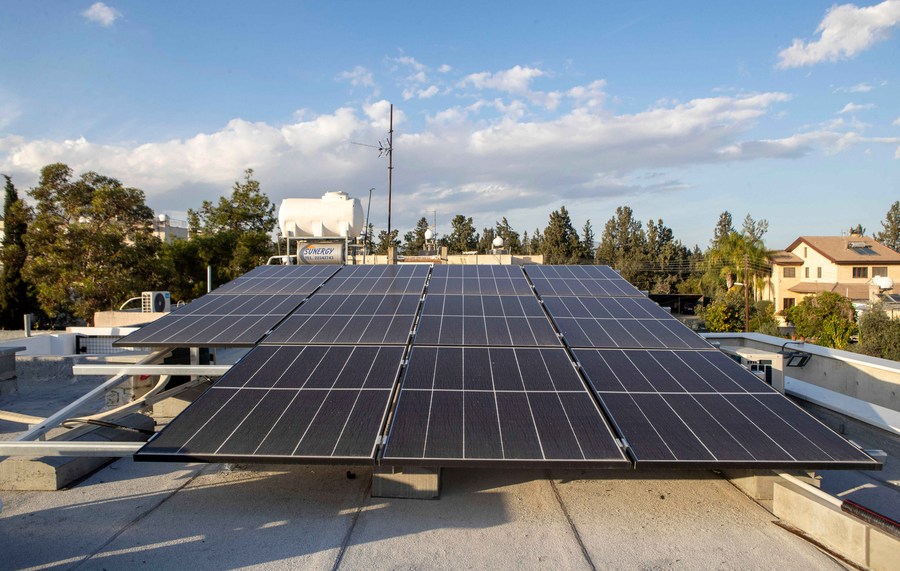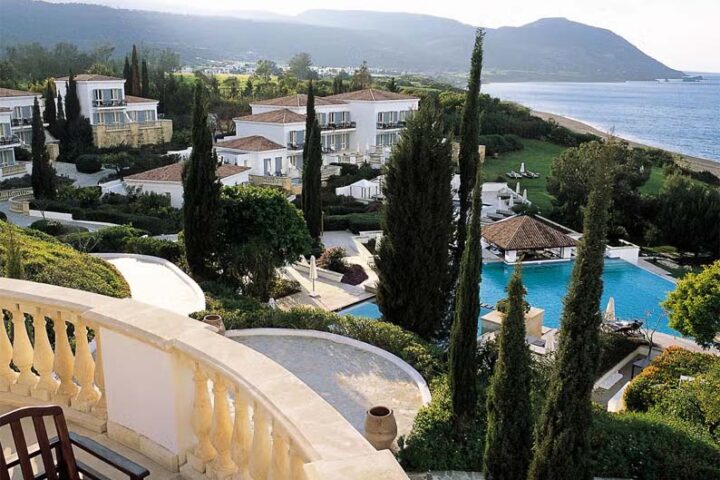The Finance and Energy Ministries have approved a grant scheme, “Photovoltaics for all”, encouraging homeowners to install solar systems on their roofs.
With the latest scheme promoted by the government, any homeowner can install a solar system to reduce electricity bills, regardless of whether they have the capital needed.
In comments to Sigma TV, Finance Minister Makis Keravnos revealed that the scheme has been approved, and they are adding the finishing touches to it, promising to deliver details in the coming months.
Keravnos said the latest scheme would differ from previous ones, as it provides people with an initial grant, while the rest of the capital needed will be given by the state, with consumers repaying the debt with monthly instalments.
Energy Minister George Papanastasiou said the ‘Solar systems for all’ will be financed by the funds collected from the Electricity Authority of Cyprus as penalties for excess CO2 emissions.
The state EAC will have to pay €300 mln of taxpayers’ money in 2023, 21% more than last year, for purchasing EU greenhouse gas emission allowances.
It paid €248 mln last year. The penalty for greenhouse gas emissions is rolled down to consumers.
The penalties are transferred to the European Union, which then returns the funds to member states on the condition that they go to green projects.
The scheme will concern households who consume less than 1000 kWh over two months.
“This category covers households of 4-5 people,” said Papanastasiou.
“These households have an average bill of around €350 to €400 for two months.
“With the installation and operation of the photovoltaic system, the cost will be reduced to €20-30”.
With current schemes, these households receive a grant of €1,500, with the consumer paying the rest of the cost.
Papanastasiou pointed out they calculated that a photovoltaic system would cost €4,000-€4,500 and would be repaid over a three-year horizon.
“The reduced bill will enable the applicant to pay more than the minimum of €150 a month.”
Once the solar system is paid off, homeowners will be given ownership, allowing them to decide whether to sell any excess juice to the EAC.
Unconvinced
Despite the government’s plans to get households on board with the transition to a carbon-neutral economy, environmentalists and energy analysts are not convinced by the project’s feasibility.
Stakeholders’ concerns are mainly tied to the capacity of the island’s grid.
In comments to the Financial Mirror, energy analyst Sotiris Kyprianou said authorities need to urgently address the issue of the grid’s limited capacity to accommodate excess energy to be produced.
“The grid’s capacity is currently the biggest obstacle to transitioning to a carbon-neutral society,” argued Kyprianou.
He gave two primary reasons for the relatively low penetration of RES in the energy system: the grid’s limited capacity and the amount of energy already being rejected.
“The grid capacity limitations became apparent since 2020 when some substations were overloaded due to high input from solar installations in rural areas such as Peristerona, Orounta, Ergates, and Athienou”.
The second reason for rejecting green energy is twofold, argued Kyprianou.
“First, there is very low energy consumption during April and May, compared to the rest of the year, coupled with a conservative approach adopted by the grid operator.”
In these months, energy consumption in Cyprus drops to around 400MW during the day.
“To ensure generator stability, the grid operator strives to keep the generators running and burning fuel.
“If green energy generation exceeds 200MW during this period, the excess has to be rejected.
“This explains the loss of 20% of the energy produced by solar parks, quoted by officials”.
Kyprianou said this loss is selective, regulated under a process called ripple control, allowing the system operator to reject their energy or shut down the systems.
This is the case for large solar parks, which are the first to be shut down, followed by solar networks ranging from 8kW (residential) to 499kW.
Cyprus Green Party leader and MP Charalampos Theopemptou confirmed that the island’s grid’s capacity is a major issue, noting that authorities need to find ways to store excess energy produced by RES.
“As per EU directives, all new buildings will have to be emissions-free in a few years.
“New buildings should rely on RES systems such as solar systems were applicable,” said Theopemptou.
“In its current state, Cyprus’ grid will not be able to manage excess energy produced by households, which will add to larger RES projects and energy pumped into the system from conventional plants.”
Theopemptou said there are options, including more imaginative ones, than installing costly batteries.
“In some EU member states, RES producers have resorted to imaginative ways based on older technology to reduce energy losses.
“A solar park can be combined with a Hydro turbine project.”
Hydro turbines are devices used in hydroelectric generation plants that transfer the energy from moving water to a rotating shaft to generate electricity.
“They use excess energy produced during the day to carry water to a reservoir on higher ground.
“At night, or whenever there is an increase in demand, they let the water run into a hydro turbine, essentially turning the energy back into electricity.”










